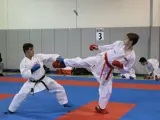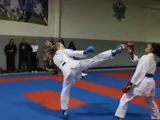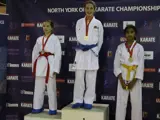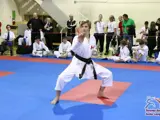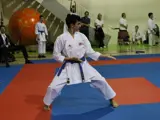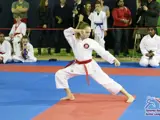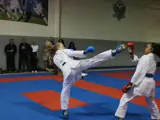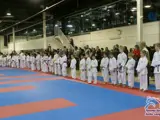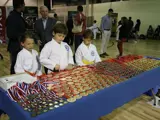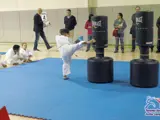Atlantic Division
Central Division
Southeast Division
Northwest Division
Pacific Division
Southwest Division
The Importance of Karate Tournaments for Young Recreational Athletes, and FAQ from Their Parents

Thank you to the coaches and parents who assisted in writing this article.
Why do young karate students need tournaments? Ask any karate instructor or parent of an experienced karate student and they'll agree: young karate students benefit greatly from tournaments. But why? Read on to understand the top five benefits of karate tournaments for students.
1. The learning experience.
Karate tournaments can provide young students with valuable insights into their own strengths and weaknesses, both in terms of karate skills and the student's ability to perform under pressure in a competitive environment. By comparing themselves with karate practitioners from other clubs, students come to understand their own relative strengths and weaknesses. This understanding, if approached in a constructive way, can give karate students invaluable motivation to improve their skills and achieve excellent results at future tournaments.
2. A test of a student's current skill level.
It is very difficult for a parent to evaluate their own child's skill level and to monitor their improvements over time. While coaches will almost always have their student's best interests at heart, some coaches may find it difficult to give parents a full idea as to the strengths and weaknesses of their child's karate skills. Participating in a karate tournament is an impartial way for students and their parents to understand the student's skill level relative to other competitors, and to gauge the gaps that need to be filled. Since tournaments give a direct comparison between students from different clubs, parents and coaches can gain valuable insights into the strengths and weaknesses of each student's performance – particularly since students will be judged by coaches and students from other clubs. The best way for students to improve their performance at tournaments is to work hard and hone their skills, but this cannot happen until the student has a full understanding of the areas that most need improvement.
3. The opportunity to overcome fear.
Most child psychologists recommend that children have the opportunity to compete in a safe environment, as it is an excellent way for children to come to understand their own inner fears and learn appropriate methods of mastering self-control. Regular access to tournaments and other competitive environments reduce the chances that a young athlete will become "frozen in fear" should they need to defend themselves against an unknown attacker.
4. Develop self-confidence.
Karate tournaments are an excellent way for young students to build their own self-confidence, giving them the opportunity to display their skills and knowledge – the results of their own hard work – while being supported and encouraged by parents, coaches, and fellow karate athletes. For some students, having their name shouted in encouragement during a noisy tournament, and understanding that there is a whole team of people eager to witness their success can be a turning point in that student's self-confidence.
5. The opportunity to set and achieve short-term goals.
Karate tournaments provide valuable motivation for students to work hard to achieve a short-term goal. With a tournament growing ever nearer, students can find additional motivation to train harder and become stronger and more resourceful during a short period of time than they otherwise might have. It is often in the weeks leading up to a tournament that karate students make enormous progress in their training.
How many tournaments should karate students participate in?
While there is no magic number of tournaments that will provide the greatest benefit to a karate student, most coaches agree that the more competition the student is exposed to, the better. Every competition makes students more focused, more determined, and provides additional motivation to become stronger and sharpen their techniques. Every competition gives students the opportunity to observe karate students from other clubs and learn valuable methods to achieve their own goals. While students may not realize it at the time, every tournament will provide at least some form of a valuable lesson, insight, or a new technique that will shape that students' progress in the future.
Ideally, karate students will participate in at least one tournament every month. Unfortunately, professional recreational karate tournaments are few and far between in both Canada and the United States, causing parents of highly dedicated karate students to travel quite extensively to access tournaments.
What are the different types of karate tournaments?
Karate competitions in North America come under two broad headings: recreational and elite. They can also be split into further categories, depending on the size and style of the tournament itself:
- Open championships for all karate clubs and styles
- Tournaments organized by a specific style of karate and open to members of that style only
- Competitions organized by local sports governing bodies on a provincial, state, or federal level
- Martial arts tournaments, open to students of a variety of martial arts styles including karate
- Smaller, amateur competitions organized by a local group of clubs, usually limited to two or three clubs per event.
What rules apply to karate tournaments? It is essential to check the rules of a tournament before entering, as rules can change from one competition to the next. In some instances, the rules of the tournament will be different to the rules that the child is familiar with in their own karate training, and it can be difficult for students to transition to new rules without having the opportunity to understand the rules in advance.
Keep in mind that the International Olympic Committee (IOC) has recognized the World Karate Federation (WKF) rules, and has stated that WKF rules will apply to karate competitions in the Olympics. For this reason, it makes sense to become familiar with WKF rules and to choose tournaments administered under this specific set of rules. Aside from the WKF rules being the official rules for the Olympic Games, this set of rules is highly beneficial to students as it prioritizes the safety of the students over anything else.
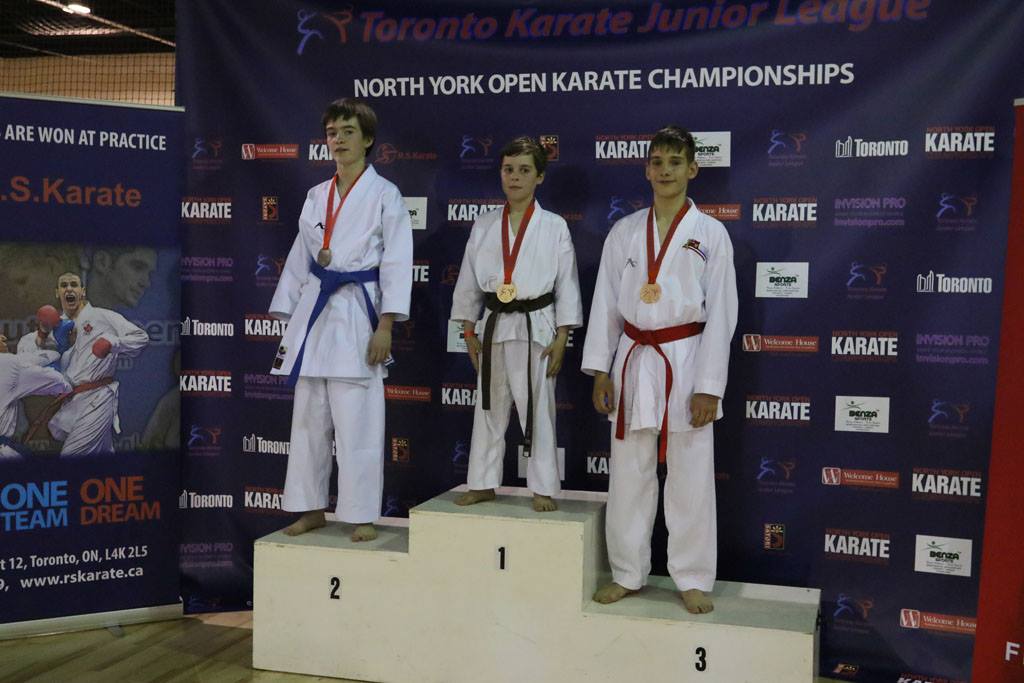
If your child is serious about karate and is considering a future as a karate athlete, it makes sense to concentrate on professionally organized, recreational karate tournaments that are based on WKF rules and which are open to all karate clubs and styles.
Learn more about the WKF rules here.
How can I find out about upcoming tournaments?
There are several ways that parents of aspiring karate masters can find out about upcoming tournaments in North America and internationally:
- Ask your instructor. Your local instructor will be best placed to provide information on local tournaments.
- Ask Google. Running a few quick searches with key phrases like "WKF karate tournaments for children", "WKF open recreational karate competitions", and "WKF style karate championships" will provide valuable information about upcoming tournaments. You can even create alerts within Google so that you will be sent an email notification if a new result comes up that matches your search term.
- Check the websites of karate associations and federations, and local sports governing bodies. By regularly checking these websites you can stay up-to-date on upcoming events that might suit your child. Some websites will allow you to register your child for upcoming events, pay fees in advance, and be notified about any new information as soon as it happens. Try sportsdata.org and sportmartialarts.com to start your search.
What should we consider when deciding whether to participate in a competition?
Before registering for a tournament, check the level and professionalism of the tournament. Start with an online check, keeping in mind that professionally organized karate tournaments tend to put a lot of importance on their online presence. Look for up-to-date information on the tournament's website, as well as a well-maintained social media presence. The team behind a well-organized tournament will be easily accessible for parents to ask questions and receive up-to-date information.
Another important consideration is who is going to accompany your child during the competition. With the majority of karate tournaments being held on weekends, it can be difficult for coaches to attend tournaments with their students. Many people don't understand that attending a tournament is an unpaid task for a karate coach and will often take up a large portion of their weekend.
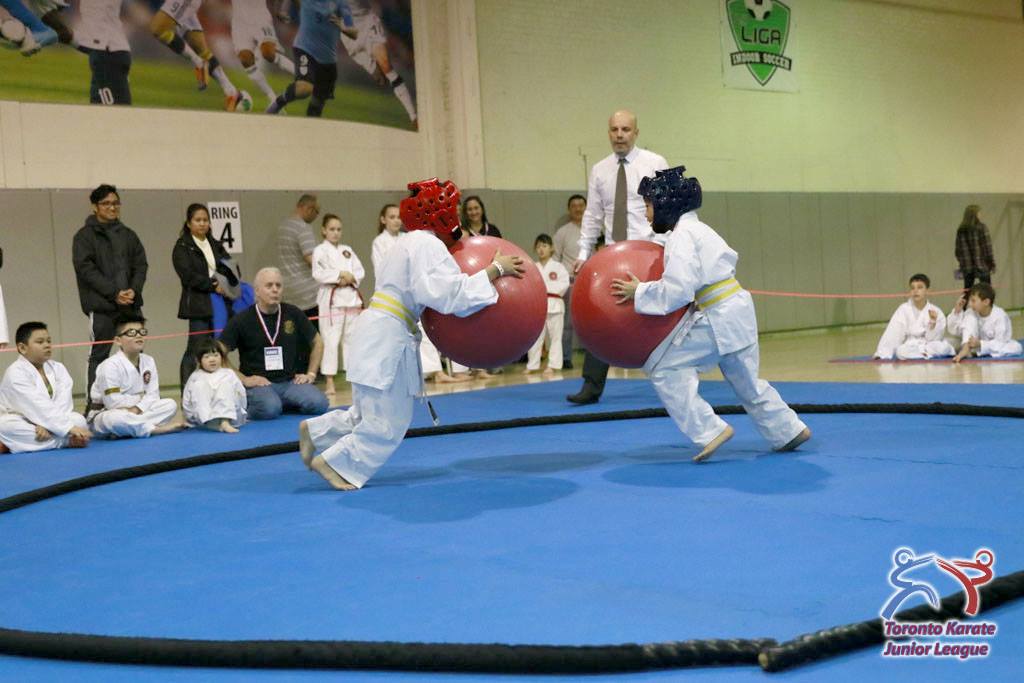
There is a widely held misconception that karate coaches attend tournaments as a way of advertising their coaching services and bringing onboard new students. However, this is very rarely the case. Firstly, coaches are usually extremely busy tending to the needs of their students at tournaments and don't have the time to promote themselves during the event. Secondly, if one or more of a coach's students lose during the competition, that coach is very unlikely to pick up new students.
If your child's karate coach can't attend a particular competition, it doesn't mean that your child has to miss out. Consider taking your child yourself, and you may be able to get other parents on board to also bring their children. On the other hand, if your child's coach never attends competitions, or discourages their students from attending, this could be a sign that the coach lacks the level of professionalism required for such an important role.
How can I find out more about karate tournaments?
For a deeper understanding of the importance of participating in diverse competitions and tournaments, please watch the documentary feature film: "Karate in Ontario: The Uphill Battle - the Cost of Raising a Champion."
This documentary gives detailed insights into karate as a sport and looks at different types of tournaments and competitions, and the process of creating future karate champions.
You can view official trailers here:
Watch the documentary for free at Amazon Prime.
Purchase your own copy of the documentary on DVD or BRD.
If you enjoyed the documentary or would like to stay up-to-date on news in the world of karate, please like our Facebook page and write a review if you enjoyed the documentary.





